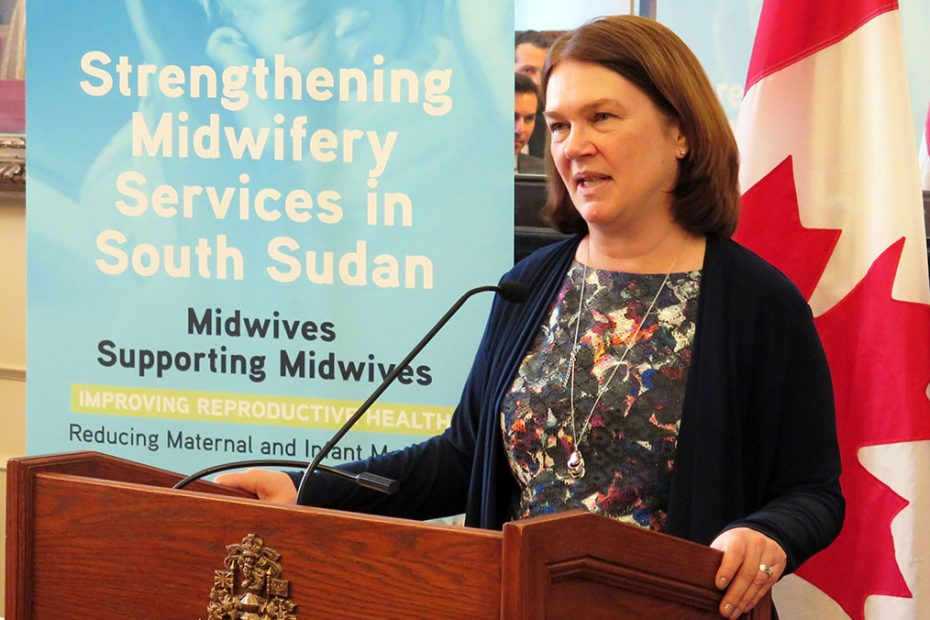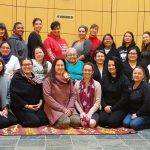See photo gallery
CAM highlights impact of midwifery strengthening in South Sudan
Approximately 70 parliamentarians, political staffers and government employees attended the Canadian Association of Midwives’ (CAM) reception on Parliament Hill to celebrate the contributions that Canadian midwives make across the country and around the world.
This is especially the case in South Sudan, where the Strengthening Midwifery Services in South Sudan project, led by United Nations Population Fund (UNFPA) and supported by the Government of Canada and others, has been instrumental in increasing the number of qualified professional midwives in South Sudan from 8 to over 250 today.
Canada’s Minister of Health, Jane Philpott, opened the ceremony by underlining the importance of having trained midwives in South Sudan. Reflecting on her own experience as a family physician having spent the first decade of her medical career living and working in similar circumstances in Niger, the Minister voiced support for CAM’s collaborative work in South Sudan and its role in maternal and reproductive health.
“I’m very happy to be in the position of being Minister of Health here in Canada, and I continue to seek ways to be a champion for healthy birthing. And it is absolutely essential for the women who are giving birth but also of course for the young lives that are brought into the world, that the experience before birth, at the time of birth and in those early months and years, that that child gets a good start in life. (…) I want to say thank you to all of you who are investing of your time and energy, your skills and expertise to be able to support healthy birthing around the world, and it will be an honor to continue to partner with you.”
– Jane Philpott, Minister of Health
Following greetings by event sponsor Anju Dhillon, Member of Parliament for Forval-Lachine-LaSalle, Geeta Lal, Senior Technical Advisor at UNFPA, spoke of the importance of continued Canadian funding for projects such as the Strengthening Midwifery Services in South Sudan project.
“I would like to particularly applaud the role of the Canadian Midwives Association (…) in the second phase of the program which started last year. They have been working tirelessly to strengthen the capacity of the midwifery association of South Sudan, improve the quality of midwives and to develop the curriculum of obstetricians and gynecologists in collaboration with the Society of Obstetricians and Gynecologists of Canada.”
– Geeta Lal, UNFPA
Speaking on behalf of the Ministry of International Development, Joel Lightbound reiterated Minister Marie-Claude Bibeau’s unwavering commitment to gender equality and the economic empowerment of women and girls.
“I can assure you, on behalf of the Minister for International Development, that the promotion of gender equality and the socio-economic empowerment of women and girls are and will continue to be at the heart of everything we will accomplish. Because we know that development, prosperity, health and stability in developing countries require the socio-economic development of women and girls. But it goes without saying that in order to do so, we will have to improve access to rights, and to sexual and reproductive health for all.”
– Joel Lightbound, Ministry of International Development
South Sudanese male midwife, Justine Mangwi Juma Olimpio graduated from the new three-year midwifery training program at the Catholic Health Training Institute in 2014 and was deployed to work as a national United Nations Volunteer by UNFPA. He is one of the 17 midwives participating in the CAM peer to peer mentorship program for newly graduated midwives. While his Canadian peer midwife, Nicole McCloud, watched on, Justine gave a touching account of his experience as a South Sudanese midwife involved in the Strengthening Midwifery Services in South Sudan project.
“Through the project, midwifery education in South Sudan is finally on the right track. The project has built the capacity of Health Sciences Institutes to international standards by recruiting international professional tutors and equipping our libraries with up-to-date textbooks, as well as skills labs. Our curriculum is now at par with international criteria and management of the Health Science Institutes is much better. “
– Justine Mangwi Juma Olimpio, South Sudanese male midwife
In 2016, the Canadian Association of Midwives joined with the UNFPA to make a difference in South Sudan, where the infant mortality rate is 105 per 1,000 live births (more than 20 times the number in Canada), and the maternal mortality rate is 2,054 per 100,000 live births (Canada’s rate is 11). One significant reason for these deaths is a critical shortage of skilled maternal and newborn health-care providers. CAM president Katrina Kilroy explains:
“Led by experienced Canadian midwives and based on similar collaborations in five other under-resourced countries, our role has been to assist capacity building for local midwives and other health care providers.”
CAM’s approach to international work is based on reciprocity, respect, and sustainability. One of the ways this is attained is through CAM’s unique peer-to-peer model that emphasizes reciprocal capacity building between health care professionals. Not only does this approach better serve the people being supported, it also motivates the Canadian midwives who participate. Canadian midwives return with new skills and a broadened perspective on their profession that helps them work with a diversity of Canadian mothers and families.



